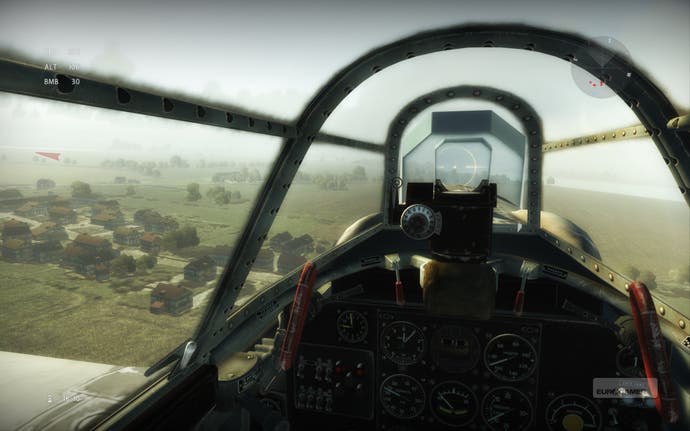IL-2 Sturmovik: Birds of Prey
It's good to hawk.
The environments are equally seductive. Combat arenas are vast - far larger than the missions technically require - but with size comes an unbeatable sense of scale, aided by a commendable draw distance. Most flight games pay scant attention to what's beneath you but with distinctive local architecture from Dover to Sicily and on to Berlin, and rolling, sprawling rural landscapes where you can even see tractor treads in a snowy Soviet winter, Sturmovik's world feels organic and real. Fly beyond the convincing cloud cover and it really does feel like there's a world beyond the invisible walls that usually hem you in.
It's well-populated too, with the game capable of filling the maps with more than 100 units. You rarely, if ever, get to see that sort of a crowd in action, but towards the end of the solo campaign you'll certainly experience hectic dogfighting between scores of fighters, while bomber squadrons thunder towards their targets and AA batteries pound the skies. It's just another example of how far the game is willing to go in order to immerse you in the seat-of-your-pants world of pre-jet aerial combat. Enemy pilots aren't particularly taxing on the Arcade setting though, and, while you'll be given a more robust challenge in the later campaign missions, a flexible AI slider would have helped keep control accessible without compromising the difficulty of the gameplay.
It's as you move up the rigid three-tier difficulty ladder that the game's attempt to be all things to all people starts to come unglued. You need to complete the relevant tutorial before the game will allow you to take to the air on the Realistic or Simulation settings, and the difficulty spike is pronounced. As well as removing the passive aiming and control aids, Realistic difficulty also introduces much less forgiving aerodynamics. Basically, if you attempt any kind of fancy flying, you'll stall. And, chances are, you'll then fall into a terminal spin. You need precision to keep your plane aloft and wrestling it back under control using two tiny thumbsticks is a fairly thankless task.

It's even more pronounced on Simulation, where all modern assists are banished. There aren't even any HUD details telling you which planes are on your side, and the only view allowed is through the tiny smudged windows of the cockpit. It's claustrophobic and terrifying, and therefore makes you appreciate just what the real pilots suffered, but without a solid flight stick to hand it also feels virtually impossible. I usually groan at PC vs. console arguments, but as an example of how the simulation suffers because of inevitable hardware restrictions, to free-look from the cockpit you need to depress the right thumbstick and then keep it pressed while rolling it around. Stick-pressing is a slippery and often unpopular design decision at the best of times, but in a game mode where you have no choice but to continually look around to manually locate enemies and objectives it's a real pain.
So the physics may be up to simulation standard, but there's no getting around the fact that unless you invest in a console-friendly stick you're going to be playing with an arcade controller. These rickety kites were hardly the most complex flying machines, but even with a proper flight stick anyone hoping for the full simulation experience will be ill-served as the core control system was, by necessity, designed around the limited inputs of a gamepad. Plane functions beyond basic control and attack amount to little more than pressing a button to lower and raise the landing gear, and even that's rarely used since most missions start in mid-air and only require you to fly out of the combat area for completion.
You're always aware that the game is torn between full simulation and accessible shoot-'em-up, so while it's admirable that Gaijin Entertainment has attempted to bring a simulator to consoles, the end result falls between the two stools. Newcomers will probably be scared by the sheer difficulty of the higher settings, but I can't help feeling that existing simulator fans won't bother accommodating the compromised joypad controls when they can just play a previous Sturmovik game on the PC with whatever depth they desire.
Going back to the dilemma from the start of the review, your enjoyment of IL-2 Sturmovik's console debut will depend greatly on what you want it to be. Taken as a rousing aerial shooter, it's easy to recommend - and sadly rather too easy to complete. There's a ton of content, at least, and it's all presented in a whiz-bang style that draws you in with heart-pounding action without belittling the history behind the explosions. It's just a shame that for such a venerable simulator series, it's the more serious game modes where Birds of Prey feels most compromised by its hardware.

